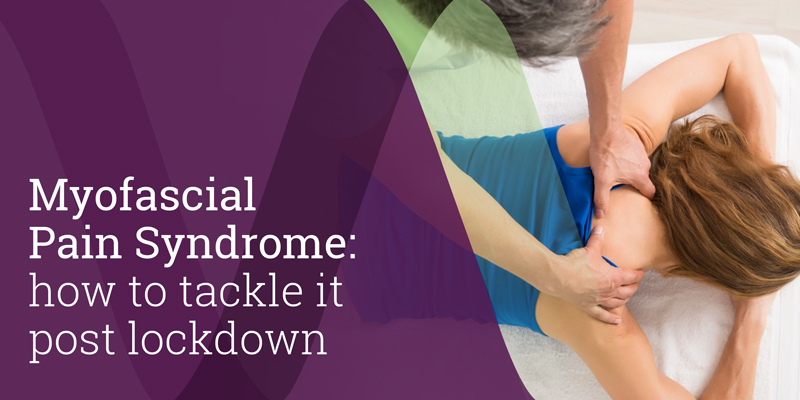
Aching muscles post lockdown? If you suffer from Myofascial Pain Syndrome (MPS), it could have got worse during the Covid-19 pandemic. Lockdown has had a distressing impact to a different extent on all of us. It was a challenging time, both mentally and physically. Find out about the treatments available and how to tackle Myofascial Pain Syndrome from New Victoria Physiotherapists and Massage Specialist Mario Moreno.
What is Myofascial Pain Syndrome?
Myofascial Pain Syndrome (MPS) is a condition that affects your muscles and fascia.
“Myo” means muscle, and “fascial” means fascia. Your fascia is the thin, white connective tissue that is wrapped around every muscle and supports your muscles allowing them to contract and stretch.
The inflammation of your soft tissues is the cause of muscle pain. It usually starts with a trigger point, a taut and painful area of muscle, which can limit the full stretch of the muscle. This is usually associated with reduced blood flow to the muscles and a build-up of waste materials that irritate the trigger point further and cause pain.
When muscle pain involves many areas of the body, it is commonly referred to as Myofascial Pain Syndrome.
MPS symptoms can include:
- muscle tension
- weakness
- stiffness
- reduced mobility
- stabbing pain
- deep aching
Sometimes dizziness or headaches can originate from trigger points as well.
What are the causes of Myofascial Pain Syndrome?
Myofascial Pain Syndrome can be caused by many factors.
Injuries, bad posture, repetitive movements, stress and excessive strain, can all affect your fascia and muscles. However, even inactivity can be a common cause for the development of trigger points and pain.
Leaving trigger points untreated can contribute to worsening pain and compensatory mechanisms in other areas of the body, which can cause further pain and discomfort.
During the lockdown, physical activity has been often overlooked and now going back to practise your favourite activities can be challenging.
Muscle pain was one of the most common GP referrals during lockdown, and people who suffer from chronic Myofascial Pain Syndrome experienced a worsening of their condition and increased pain.
As you try and get back to your fitness routine, it is better to increase the intensity of your work gradually and avoid strenuous efforts as overdoing it might put your musculoskeletal system under too much pressure, especially after a period inactivity.
What are the most common Physiotherapy treatments for Myofascial Pain Syndrome?
Physiotherapy can help to manage MPS or even support you while you go gradually back to your fitness routine.
Some of the treatments that can be successful in managing Myofascial Pain Syndrome are:
- Musculoskeletal Therapy – gentle exercises and stretches to help restore movement and strength
- Massage Therapy – myofascial release to gently manipulate the fascia and muscles
- Acupuncture – needles are applied in and around the trigger points
- Advice on posture – according to your type of job and lifestyle
After an initial assessment, your Physiotherapist will suggest the most appropriate massage therapy techniques and treatments combination.
The benefits of Massage Therapy are:
- Improved circulation to the muscles
- Relieve tight muscles and increase flexibility
- Decreased pain
- Reduce stress
- Reduce muscle spasms
- Breakdown of scar tissue
- Relaxation
- Prevent delayed muscle soreness
The number of sessions needed will depend on the findings following your assessment. Your Physiotherapist will then share with you an ad hoc therapy plan.
Massage therapy and myofascial release techniques can also be used to prevent muscle pain and avoid injuries when returning to exercise and fitness after a period of inactivity.
Is it safe to have a massage during Covid-19?
As a patient, you must be mindful of the social distancing policy in place and wear a surgical mask when you attend your Physiotherapy appointment.
At New Victoria Hospital, we have put in place several infection prevention measures to welcome all our patients in a safe environment.
All our staff wear all the necessary PPEs as indicated by the latest guidelines from Public Health England.
Other useful tips for tackling Myofascial Pain Syndrome
There are things that you can do that can help to reduce symptoms or prevent MPS and muscle pain in your daily life.
If you work long hours at your desk, drive or stay in the same position for a long time, remember to adjust your posture.
Keep your shoulders down and try to sit more upright. Take a break regularly, walk and stretch your muscles.
A healthy lifestyle with a balanced diet, avoiding smoke and alcohol can contribute to your general wellbeing.
Our Physiotherapy Department offers specialised massage therapy treatments with our massage therapist to help you ease muscle pain and achieve optimal physical wellbeing to start being active again.
To receive more information on how Massage Therapy can improve your Myofascial Pain Syndrome and tense muscles, or book an appointment with one of our highly-specialised Physiotherapists or massage therapist, you can call us on 020 8948 9040 or:












